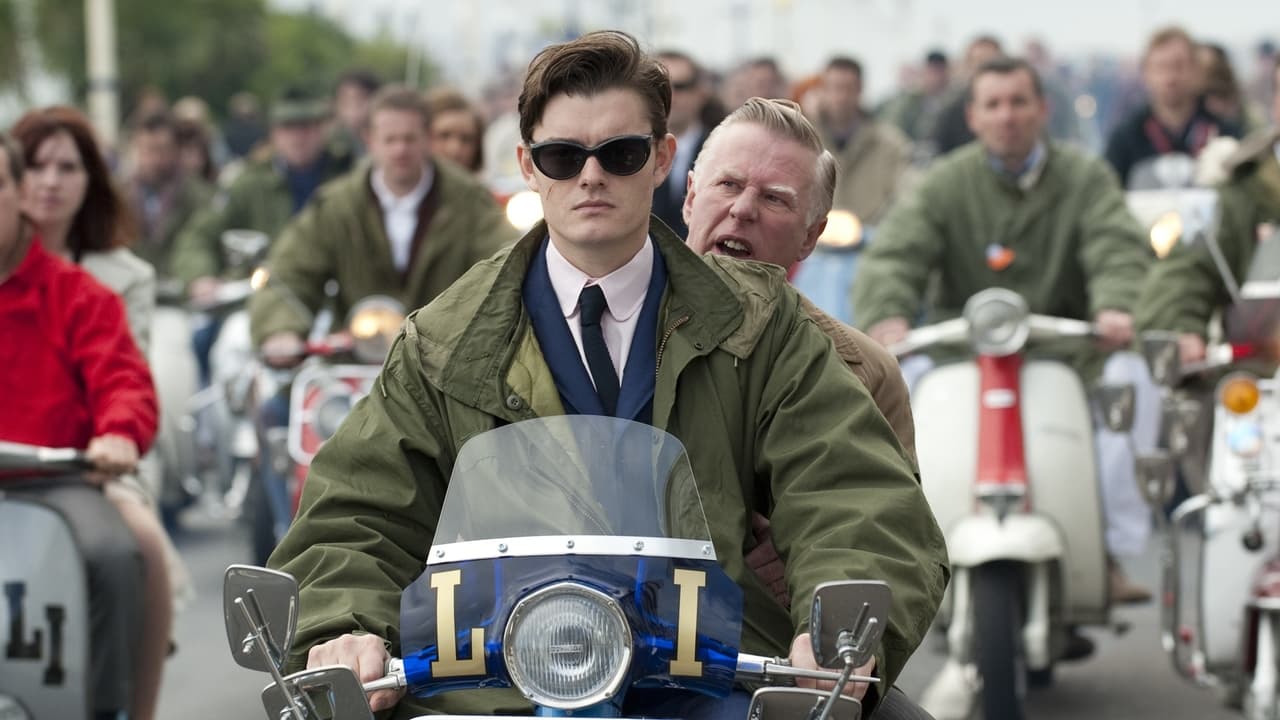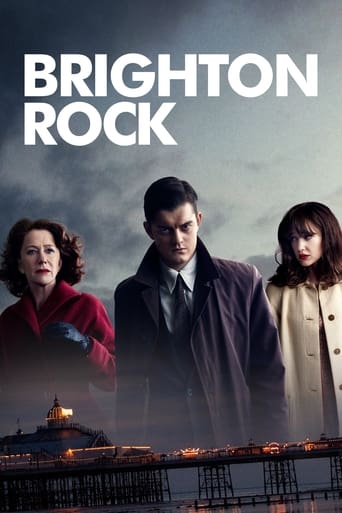

I watched this because of Helen Mirren, not realizing that I saw the original starring Richard Attenborough. That film is highly thought of, but I did not give it a great review on IMDb and actually don't remember that much about it. In fact had I not looked up the 2010 Brighton Rock, I wouldn't have realized I saw the original.Brighton Rock concerns a rotten-to-the-core thug, Pinkie (Sam Riley) who must become involved with a shy waitress (Andrea Riseborough) in order to keep her from going to the police about a man whom he murdered. Her boss at the tea shop (Mirren) is afraid for her and sets out to try to bring him to justice. In the original, the tea shop owner, Ida, was played by Hermoine Baddeley. Talk about a difference in casting. Mirren is sexy and well- dressed, sporting a lower-class accent, and is marvelous.My problem with the original was I couldn't understand any woman, no matter how young, how desperate, falling for Dickie Attenborough. I wrote that had Dirk Bogarde played the role, you could at least believe she fell for his looks.Sam Riley as Pinkie is cute, if you don't mind that his face was slashed, but this part of the story is still weak. He is too abusive to Rose, and his attempts to be nice are pathetic. We see where she lives when Ida visits her at home. One step into Pinkie's place and I'd have been outside, running and screaming.Nevertheless, this is a well-acted, atmospheric, and tough film that will attract some viewers. But see the original for Attenborough's amazing performance.
... View MoreSometimes it's a character you liked that attracts, like the role Philip Davis played in Midsomer Murders. Other times it's to see a great star like Helen Mirren.Whatever the reason, it's always good to see a film based on a Graham Greene novel, like The Third Man, This Gun for Hire, The Quiet American, and many more.A young Richard Attenborough played in this movie in the 40's, here is falls to Sam Riley (Control, Maleficent) to play the lead. He is capably assisted by Andrea Riseborough (Oblivion, Shadow Dancer), as the waitress he marries to keep her from testifying as a witness.A good neo-noir with contributions from William Hurt and Nonso Anozie (The Grey, Game of Thrones).
... View MoreThe main character of this movie is Pinkie Brown, a small-time thug in Brighton, England, in the 1960s. Pinkie's true evil nature comes out when he tries to take over a small gang of criminals after their leader had been killed by a rival gang. As played here, Pinkie is in his 20s and, as brash and amoral as he is, he and his mediocre cohorts are no match for the rival gang that basically runs underground crime in Brighton. The action is sordid and ugly, but the glossy color photography works at cross purposes to conveying that mood. Much of the photography is more appropriate for an art film than for this down-and-dirty fare, making me think that maybe black and white would have been a more appropriate choice. As Pinkie, I found Sam Riley just a little too handsome for the part--he does not exude the menace and harsh personality that is Pinkie's nature.I found the initial setup scenes rapid-paced and confusing, requiring close attention; if you don't follow what has happened early on, you will be at a loss to fully understand what happens later. An additional complication to my following the opening scenes was the fact that I am not a Brit and didn't always follow the cadences and clipped manner of speaking. I confess to starting the movie over after about fifteen minutes, with English subtitles turned on. That was a great help.The score that often seems to aspire to the transcendent seems greatly out of place.I wish I had seen this movie before having read the book, since having some of the images in mind would have been good. Never having been to Brighton, my mental picture of it would have been greatly enhanced by what is well captured here. While the movie strips from the book much of the depth of the themes of sexuality, morality, loyalty, and sin, there are things in the movie that I found improved upon the book. I liked Helen Mirren's portrayal of Ida as a more centered person than the blithe Ida of the book, and John Hurt fleshed out Ida's friend Phil better than what I got from the book. And there are a lot of little things. For example, I pictured the candy, Brighton rock, as being something like a candy cane rather than the weighty rod seen in the movie. I regret that Pinkie's lawyer Prewitt was deleted--he was a truly Dickensian character in the book. And why the great ending in the book was changed is beyond me.
... View MoreThis picture was beautifully photographed, acted brilliantly - it was atmospheric and Pinkie - Sam Riley gave a 'haunting' performance.Brighton in the 60's was portrayed very well and I loved the pseudo Quadrophenia angle to it - well done for that.The cliff scenes, were not as one reviewer from the US related to as Dover, were filmed at the Seven Sisters - Sussex own cliffs - the scenes were literally breath taking.My only criticism of the film was in the continuity - Brighton to Eastbourne -the final scene - wasn't minutes away - it is quite a drive especially on the A259, would have taken a drive of some 45 minutes in the 60's Overall view - this film warranted 9/10 for me - No remake equals the original and 2010 Brighton Rock is no exception - but then the makers never intended it to be a remake of the original, otherwise it would have been set in the late 40's and not 60's Well done!!!
... View More